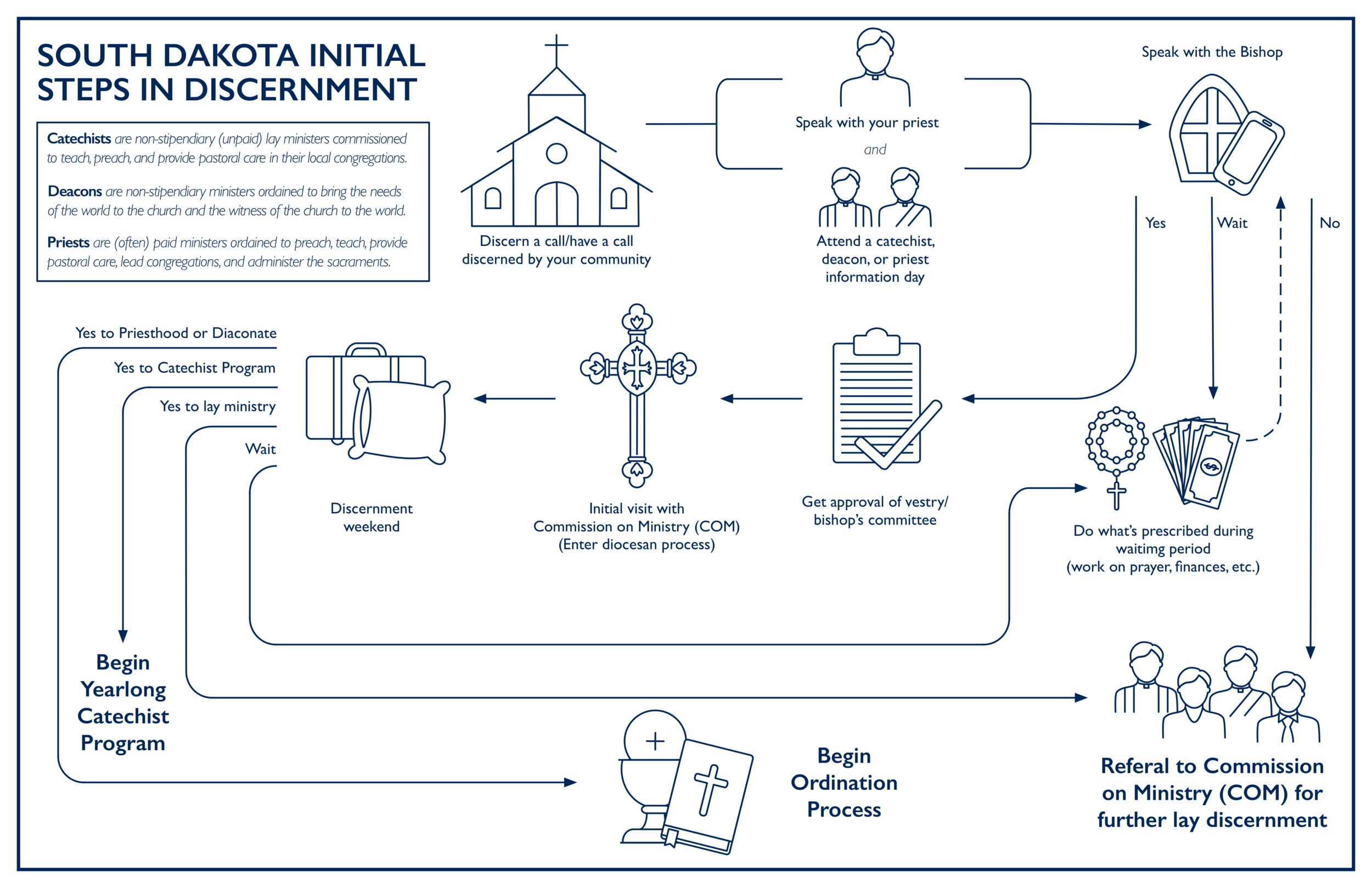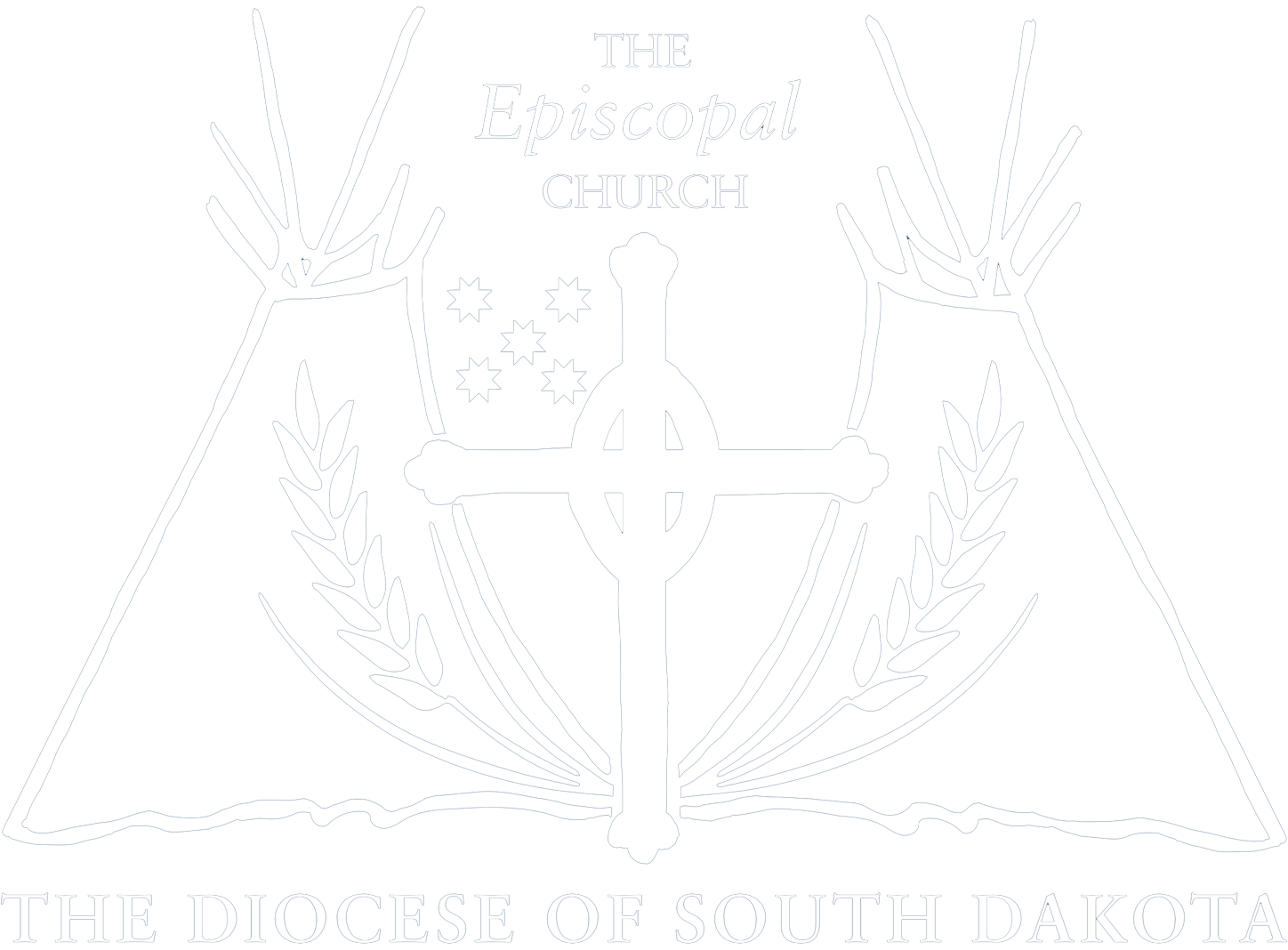
Discernment & Spiritual Formation
Discernment Process Re-Opens
At the bottom of the page, you will find a diagram outlining the process described below
The Episcopal Diocese of South Dakota is pleased to announce the re-opening of its discernment process for those considering a call to the permanent diaconate or priesthood. We have sought to re-tool our discernment process so that it is easy for everyone to follow and understand. We have also added some elements into the process which we trust will help us better understand the workings of the Holy Spirit within the candidate’s life and the needs of our diocese.
Our new discernment process, in a nutshell, is as follows. A person who is exploring a call to the priesthood, diaconate, or catechist is to meet with their clergy person. It is expected that the clergy person and the person who is considering beginning a discernment process have several visits about their potential call and their understanding of this call. The second step would be for the person to attend a “Catechist, Deacon, and Priest Information Day.” This time will provide the person with a better idea of these different ministries, and how they are being fulfilled in the Diocese of South Dakota.
After visiting with their clergyperson and attending the Information Day, the clergy person will call the Diocesan Office and schedule an appointment. The Bishop’s response, following that meeting with both the person and their clergy person together, will be “Yes,” “No,” or “Wait.” If the response is a “Yes”, then the person will move forward to the next step. If the answer is “No”, the person will be given help to find their “Yes” – that is, we will help that person discover what their call might be in the Church. If the answer is “Wait”, the person will be told about the reasons and what they are to be doing during the waiting period.
If the person is proceeding with discerning a call, the next steps will be to meet with their Vestry or Bishop’s Committee to receive their approval and have an initial visit with the Commission on Ministry (COM). If the Vestry / Bishop’s Committee approval is obtained, and if the COM concurs, the person will then attend a “Discernment Weekend.” Following the “Discernment Weekend,” a recommendation will be offered to the Bishop and Commission on Ministry. The recommendation may be for this person to move forward with exploring a call to become a deacon, priest, catechist, or to explore some other area of lay ministry. The recommendation may also be for the person to “wait” – and, if so, those conducting the Discernment Weekend person will recommend what they think this person should be doing during the waiting period.
Those approved to move forward in exploring the call to become a priest or deacon will be required to have a physical and a psychological examination. Once these have been completed, the person will meet again with the Commission on Ministry for a postulancy interview. Following that interview, the COM will make a formal recommendation to the Bishop as to whether this person should become a Postulant for Holy Orders or whether they should wait.
The Bishop will then make the final determination as to whether the person should be made a Postulant. If postulancy is grated, the person will meet with the Bishop and the Canon to the Ordinary to discuss how they will be formed. If the person is exploring a call to the diaconate, they may attend our diocese’s Niobrara School for Ministry, or a tuition-free seminary (or show how they will leave a seminary “debt free”). They may also attend a formation program that has been approved by the Indigenous Ministries of the Episcopal Church. If a person is exploring a call to the priesthood, they may attend a tuition-free seminary (or show how they will leave a seminary “debt free”) or enroll in a formation program that has been approved by the Indigenous Ministries of the Episcopal Church. (The Niobrara School of Ministry will no longer be offering its own separate program for the formation of those considering the priesthood.)
We want to stress that this process is one of “discernment” and by no means is a guarantee that one will be ordained. There will be other requirements that a person will be asked to fulfill, and some of these requirements will require time, travel, and sacrifice. The ability to give of one’s time – and the necessity of being able to travel – and the willingness to be able to make sacrifices for the sake of the call are all crucial elements to being a successful minister, and especially so in the Diocese of South Dakota.
We are excited to be able to launch this new process, and we look forward to meeting those whom the Holy Spirit will be calling to serve in these respective ministries. Furthermore, we encourage our clergy and lay leaders to actively recruit those in their congregations who, especially from a young age, are showing signs of faithfulness and leadership ability.
May God bless this new process of ours – and all who enter it!

